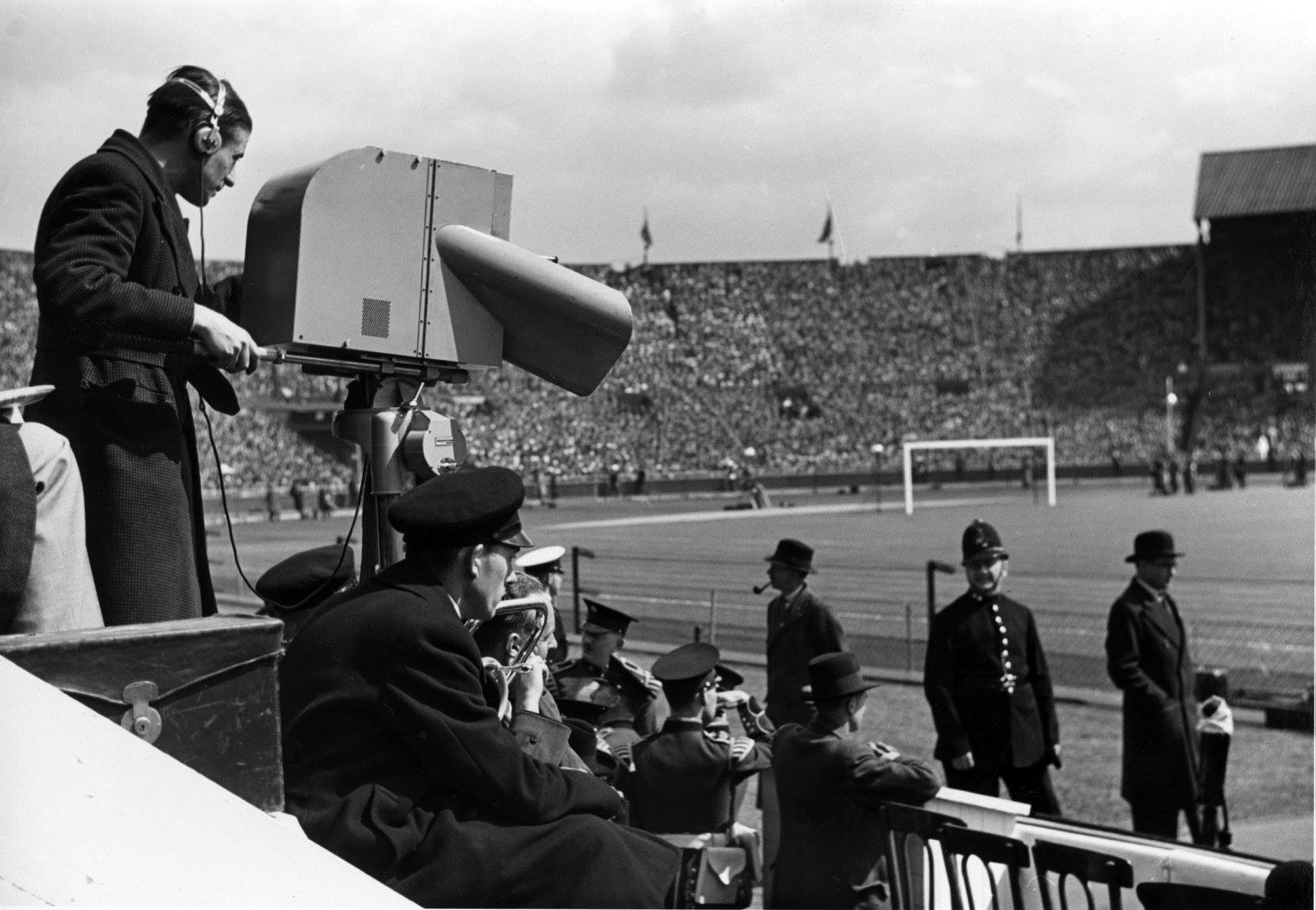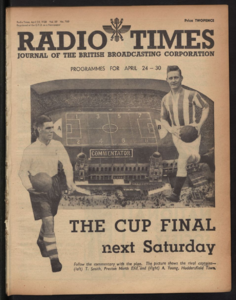1938 FA Cup Final (partially found footage of football match; 1938): Difference between revisions
No edit summary |
|||
| Line 10: | Line 10: | ||
Both Preston North End and Huddersfield Town, as First Division members, entered the tournament in the Third Round proper. Preston North End defeated West Ham United, Leicester City, Arsenal, Brentford and Aston Villa to reach the Final. Meanwhile, Huddersfield Town's journey to the Final including it overcoming Hull City, Notts County, Liverpool, York City and previous year's champion Sunderland.<ref>[http://www.rsssf.com/tablese/engcup1938.html ''Rec.Sport.Soccer Statistics Foundation'' listing of the 1937-38 FA Cup results.] Retrieved 03 May '21</ref> Preston North End were looking to add to their 1889 win, and to redeem themselves following their [[1937 FA Cup Final (partially found footage of football match; 1937)|1937 FA Cup Final]] loss to Sunderland.<ref>[https://www.pnefc.net/club/club-history/ Preston North End website concerning the club's FA Cup wins.] Retrieved 03 May '21</ref><ref>[https://www.thenorthernecho.co.uk/sport/17555277.1937-sunderland-won-fa-cup-first-time-ending-53-years-hurt/ ''The Northern Echo'' concerning Sunderland beating Preston North End for the 1937 FA Cup.] Retrieved 03 May '21</ref> The team also had vengeance as motivation. Indeed, Huddersfield Town were motivated to win their second title too, following their 1922 victory, which ironically involved the club defeating Preston in the Final.<ref>[https://www.examinerlive.co.uk/sport/football/news/cup-final-controversy-previous-meetings-12040345 ''The Huddersfield Daily Examiner.'' concerning Huddersfield Town beating Preston North End for the 1922 FA Cup.] Retrieved 03 May '21</ref> | Both Preston North End and Huddersfield Town, as First Division members, entered the tournament in the Third Round proper. Preston North End defeated West Ham United, Leicester City, Arsenal, Brentford and Aston Villa to reach the Final. Meanwhile, Huddersfield Town's journey to the Final including it overcoming Hull City, Notts County, Liverpool, York City and previous year's champion Sunderland.<ref>[http://www.rsssf.com/tablese/engcup1938.html ''Rec.Sport.Soccer Statistics Foundation'' listing of the 1937-38 FA Cup results.] Retrieved 03 May '21</ref> Preston North End were looking to add to their 1889 win, and to redeem themselves following their [[1937 FA Cup Final (partially found footage of football match; 1937)|1937 FA Cup Final]] loss to Sunderland.<ref>[https://www.pnefc.net/club/club-history/ Preston North End website concerning the club's FA Cup wins.] Retrieved 03 May '21</ref><ref>[https://www.thenorthernecho.co.uk/sport/17555277.1937-sunderland-won-fa-cup-first-time-ending-53-years-hurt/ ''The Northern Echo'' concerning Sunderland beating Preston North End for the 1937 FA Cup.] Retrieved 03 May '21</ref> The team also had vengeance as motivation. Indeed, Huddersfield Town were motivated to win their second title too, following their 1922 victory, which ironically involved the club defeating Preston in the Final.<ref>[https://www.examinerlive.co.uk/sport/football/news/cup-final-controversy-previous-meetings-12040345 ''The Huddersfield Daily Examiner.'' concerning Huddersfield Town beating Preston North End for the 1922 FA Cup.] Retrieved 03 May '21</ref> | ||
Meanwhile, the BBC had achieved success broadcasting football matches for its relatively new Television Service. After | Meanwhile, the BBC had achieved success broadcasting football matches for its relatively new Television Service. After the BBC had partially shown the 1937 FA Cup Final, it broadcasted a match between [[Arsenal vs Arsenal Reserves (lost footage of early BBC televised football match; 1937)|Arsenal and Arsenal Reserves]].<ref>[https://www.theguardian.com/football/tvandradioblog/2015/sep/16/how-arsenal-blazed-tv-trail-jostling-for-airtime-with-cartoons-and-smut ''The Guardian'', which listed the 1938 FA Cup Final as the second ever match to be fully televised.] Retrieved 03 May '21</ref> For the following year's FA Cup, the BBC were more ambitious, seeking to transmit the entirety of the game on television. The company had a conducted a test earlier the year, by broadcasting an international game between [[England 0-1 Scotland (partially found international football match; 1938)|England and Scotland]] in full. With that broadcast a success, the BBC were looking to ramp things up by broadcasting what was deemed a bigger event. Having obtained permission by the Football Association (FA) to broadcast the game at Wembley, work was conducted throughout by having the outside broadcast unit of two vans relaying all football action to Alexandra Palace, the connection achieved through an aerial placed between the stadium's domes.<ref>[https://www.bbc.com/historyofthebbc/anniversaries/april/fa-cup-final ''BBC'' article concerning televising the 1938 FA Cup Final.] Retrieved 03 May '21</ref> | ||
Ultimately, Preston North End would go on to win its second and to date final FA Cup 1-0. The match was goalless, leading to extra time when Preston's George Mutch scored the winning goal in the final minute via a penalty. To this day, neither side has reached the FA Cup Final again. Meanwhile, the FA Cup became a cornerstone of football television broadcasts, to the extent where it must be broadcast on free-to-air television channels. | Ultimately, Preston North End would go on to win its second and to date final FA Cup 1-0. The match was goalless, leading to extra time when Preston's George Mutch scored the winning goal in the final minute via a penalty. To this day, neither side has reached the FA Cup Final again. Meanwhile, the FA Cup became a cornerstone of football television broadcasts, to the extent where it must be broadcast on free-to-air television channels. | ||
==Availability== | ==Availability== | ||
Like other early BBC television broadcasts, the 1938 FA Cup was broadcast live and was not recorded. Therefore, any televised footage of the event is | Like other early BBC television broadcasts, the 1938 FA Cup was broadcast live and was not recorded. Therefore, any televised footage of the event is most likely permanently missing. However, the match itself is not fully missing. Fragments of the match itself were recorded by ''British Movietone'' and ''British Pathé'', and are still publicly accessible. | ||
==Gallery== | ==Gallery== | ||
Revision as of 16:26, 24 January 2022
The 1938 FA Cup Final cumulated the end of the 63rd FA Cup season. Featuring Preston North End facing and winning its second FA Cup against Huddersfield Town at Wembley Stadium in front of an audience of 93,497,[1] this was the first FA Cup to be fully televised, a trend that continues to the present day.
Background
Both Preston North End and Huddersfield Town, as First Division members, entered the tournament in the Third Round proper. Preston North End defeated West Ham United, Leicester City, Arsenal, Brentford and Aston Villa to reach the Final. Meanwhile, Huddersfield Town's journey to the Final including it overcoming Hull City, Notts County, Liverpool, York City and previous year's champion Sunderland.[2] Preston North End were looking to add to their 1889 win, and to redeem themselves following their 1937 FA Cup Final loss to Sunderland.[3][4] The team also had vengeance as motivation. Indeed, Huddersfield Town were motivated to win their second title too, following their 1922 victory, which ironically involved the club defeating Preston in the Final.[5]
Meanwhile, the BBC had achieved success broadcasting football matches for its relatively new Television Service. After the BBC had partially shown the 1937 FA Cup Final, it broadcasted a match between Arsenal and Arsenal Reserves.[6] For the following year's FA Cup, the BBC were more ambitious, seeking to transmit the entirety of the game on television. The company had a conducted a test earlier the year, by broadcasting an international game between England and Scotland in full. With that broadcast a success, the BBC were looking to ramp things up by broadcasting what was deemed a bigger event. Having obtained permission by the Football Association (FA) to broadcast the game at Wembley, work was conducted throughout by having the outside broadcast unit of two vans relaying all football action to Alexandra Palace, the connection achieved through an aerial placed between the stadium's domes.[7]
Ultimately, Preston North End would go on to win its second and to date final FA Cup 1-0. The match was goalless, leading to extra time when Preston's George Mutch scored the winning goal in the final minute via a penalty. To this day, neither side has reached the FA Cup Final again. Meanwhile, the FA Cup became a cornerstone of football television broadcasts, to the extent where it must be broadcast on free-to-air television channels.
Availability
Like other early BBC television broadcasts, the 1938 FA Cup was broadcast live and was not recorded. Therefore, any televised footage of the event is most likely permanently missing. However, the match itself is not fully missing. Fragments of the match itself were recorded by British Movietone and British Pathé, and are still publicly accessible.
Gallery
Images
See Also (Early BBC Television Media)
- An Inspector Calls (lost television adaptation of play; 1948)
- Ann and Harold (lost early BBC drama television series; 1938)
- BBC Election Night (lost coverage of British general elections; 1950-1951)
- Cook's Night Out (lost early BBC cooking show; 1937)
- BBC Television Service Opening Night (coming soon)
- Dish of the Month (lost early BBC cooking show; 1937)
- First Aid (lost early BBC medical show; 1937)
- Foundations of Cookery (lost early BBC cooking show; 1939)
- Marcel Boulestin television shorts (lost early BBC programs; 1937-1939)
- RCA recording of BBC Television Service (found footage of pre-Second World War BBC television broadcast; 1938)
- Sea Stories (lost early BBC talk show; 1936-1937)
- Spelling Bee (lost early BBC game show; 1938)
- Telecrime (lost early BBC crime drama; 1938-1939; 1946)
- The Care of Your Car (lost early BBC motoring show; 1947)
- The Wasp's Nest (lost early BBC television adaptation of Agatha Christie short story; 1937)
See Also (Early Sports Television Media)
- 1931 Epsom Derby (lost televised footage of horse racing event; 1931)
- 1934 Philo T. Farnsworth broadcasts (lost early television demonstrations; 1934)
- 1936 Summer Olympics (lost television coverage of Berlin Games; 1936)
- 1937 International Imperial Trophy Race (lost footage of motor race; 1937)
- 1937 Wimbledon Championships (partially found footage of tennis tournament; 1937)
- 1938 Ashes Series (partially found footage of international test cricket match; 1938)
- 1938 Pennsylvania Quakers football season (lost early televised college football games; 1938)
- 1953 British Grand Prix (partially found footage of Formula One race; 1953)
- 1960 Daytona Races (lost CBS and NBC televised footage of NASCAR prelude events to Daytona 500; 1960)
- Brooklyn Dodgers 2-5 6-1 Cincinnati Reds (lost footage of MLB doubleheader; 1939)
- Brooklyn Dodgers 23-14 Philadelphia Eagles (lost footage of NFL game; 1939)
- Catch-As-Catch-Can Wrestling (lost early BBC televised professional wrestling matches; 1938-1939; 1946-1947)
- Columbia Lions 1-2 Princeton Tigers (partially found footage of college baseball game; 1939)
- Darts and Shove Ha'penny (lost early BBC televised darts matches; 1936-1939)
- England 16-21 Scotland (partially found footage of rugby match; 1938)
- Fordham Rams 34-7 Waynesburg Yellow Jackets (lost footage of college football game; 1939)
- Indianapolis 500 WFBM-TV Broadcasts (lost racing footage; 1949-1950)
- The Boat Race 1938 (partially found footage of rowing race; 1938)
See Also (Association Football/Soccer Media)
- 1937 FA Cup Final (partially found footage of football match; 1937)
- 1939 FA Cup Final (partially found footage of football match; 1939)
- 1966 FIFA World Cup Final (partially found original colour film of international football match; 1966)
- Arsenal vs Arsenal Reserves (lost footage of early BBC televised football match; 1937)
- Barbados 4–2 Grenada (partially found soccer match footage; 1994)
- Brian Clough's Football Fortunes (lost DOS port of football management game; 1987)
- England 0-1 Scotland (partially found international football match; 1938)
- Hallo! Bundesliga (lost GolTV series; mid 2000s-mid 2010s)
- United! (lost British soap opera; 1965-1967)
References
- ↑ FA Cup Finals detailing Preston North End's 1938 FA Cup victory. Retrieved 03 May '21
- ↑ Rec.Sport.Soccer Statistics Foundation listing of the 1937-38 FA Cup results. Retrieved 03 May '21
- ↑ Preston North End website concerning the club's FA Cup wins. Retrieved 03 May '21
- ↑ The Northern Echo concerning Sunderland beating Preston North End for the 1937 FA Cup. Retrieved 03 May '21
- ↑ The Huddersfield Daily Examiner. concerning Huddersfield Town beating Preston North End for the 1922 FA Cup. Retrieved 03 May '21
- ↑ The Guardian, which listed the 1938 FA Cup Final as the second ever match to be fully televised. Retrieved 03 May '21
- ↑ BBC article concerning televising the 1938 FA Cup Final. Retrieved 03 May '21


